unit 3 the million pound bank-note 宾语从句表语从句
文档属性
| 名称 | unit 3 the million pound bank-note 宾语从句表语从句 |
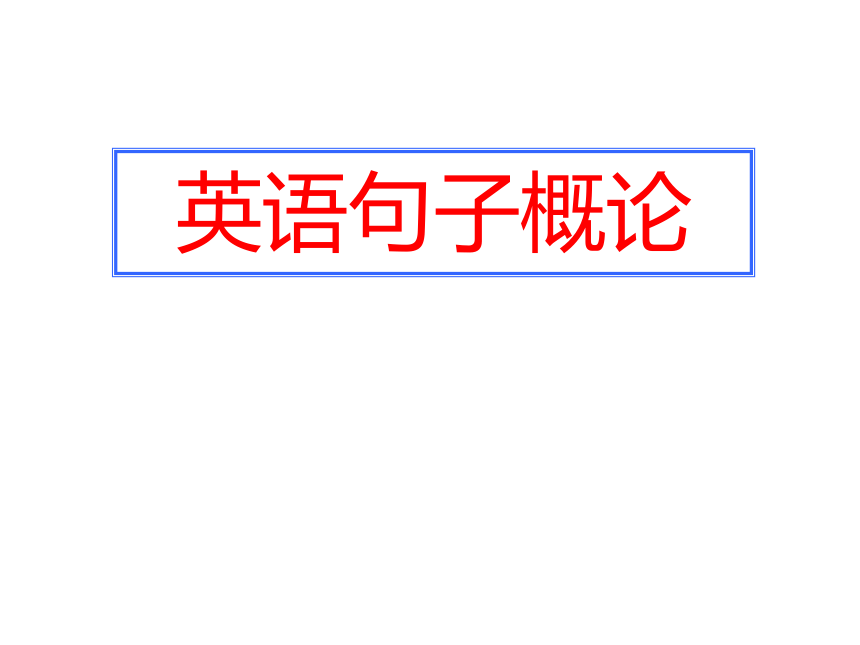
|
|
| 格式 | rar | ||
| 文件大小 | 401.9KB | ||
| 资源类型 | 教案 | ||
| 版本资源 | 人教版(新课程标准) | ||
| 科目 | 英语 | ||
| 更新时间 | 2010-12-04 00:00:00 | ||
图片预览

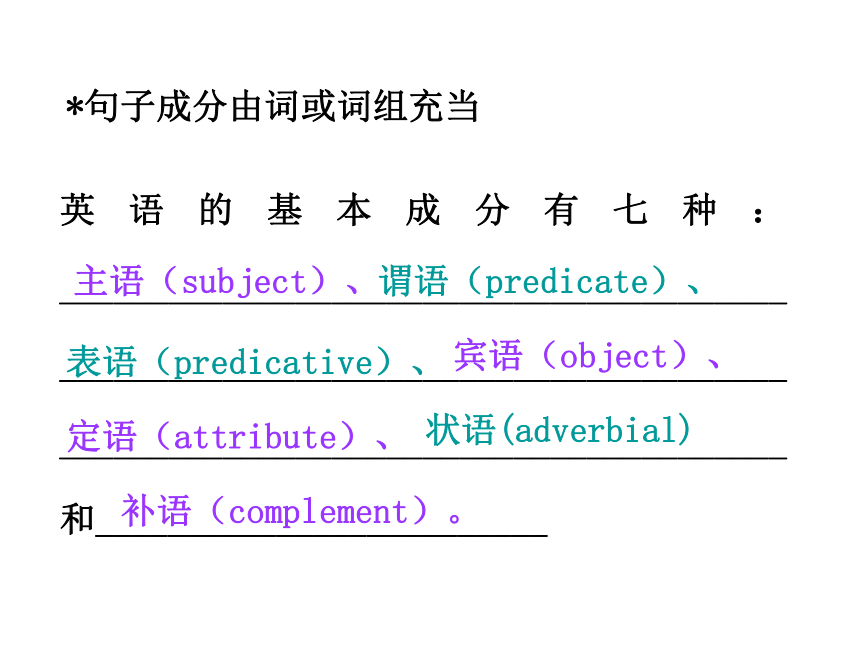
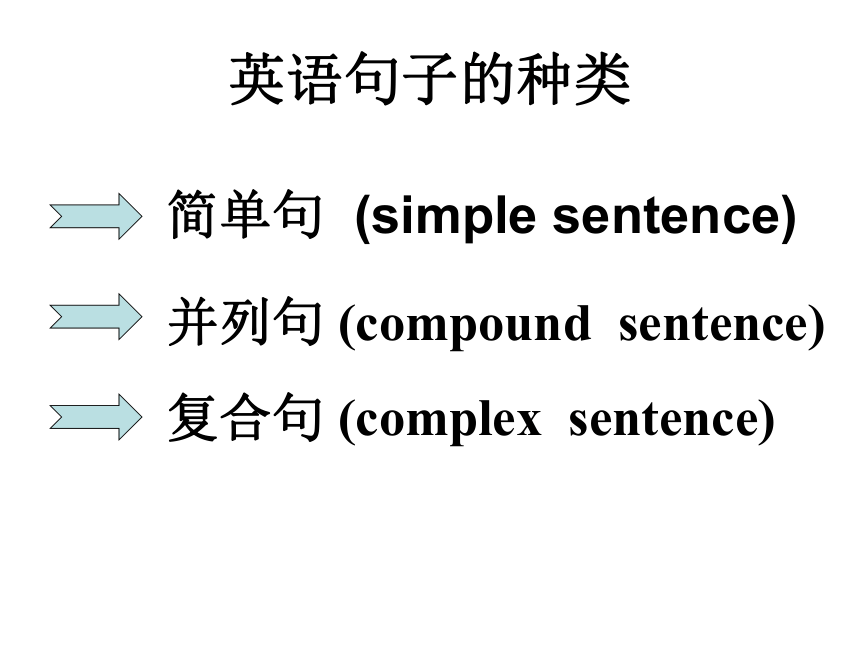
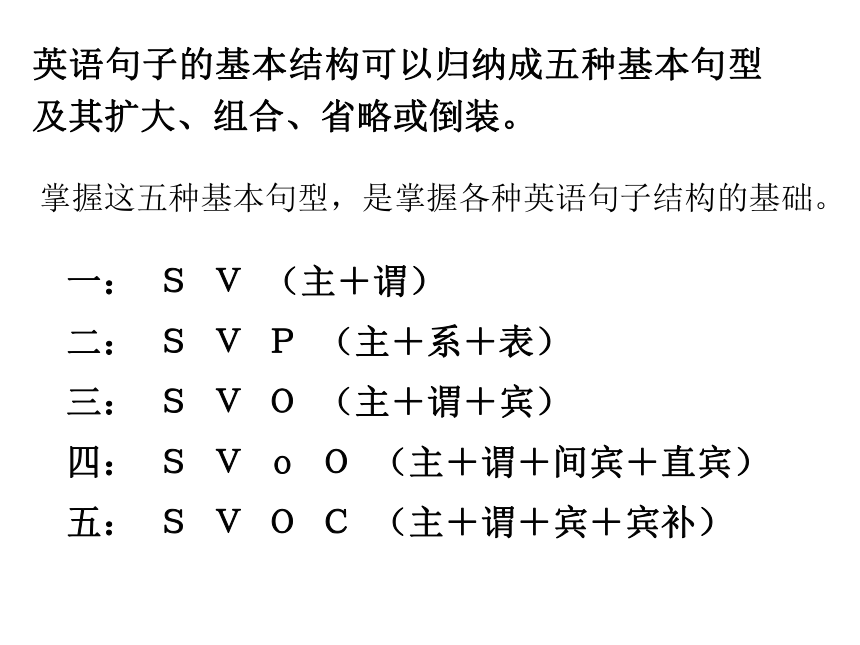
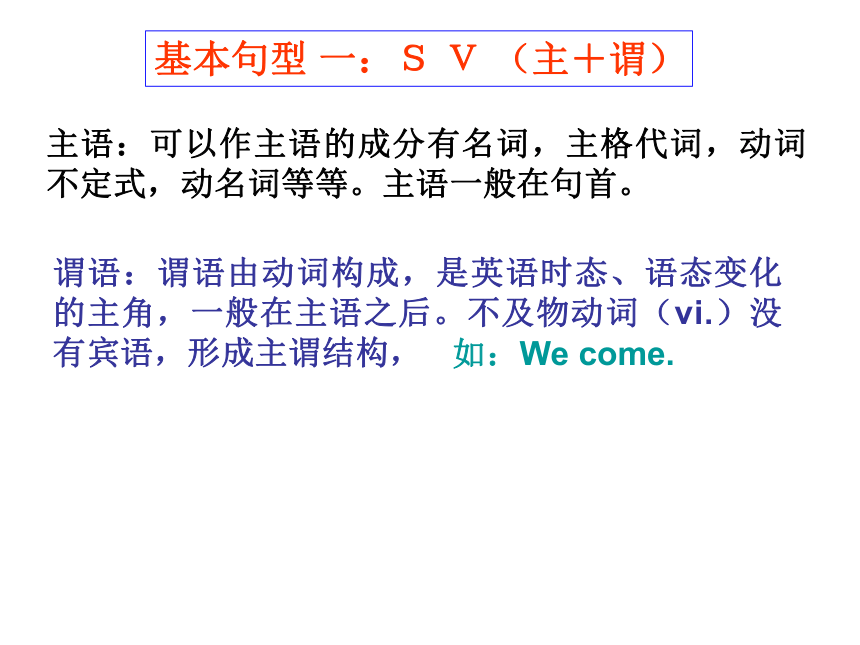
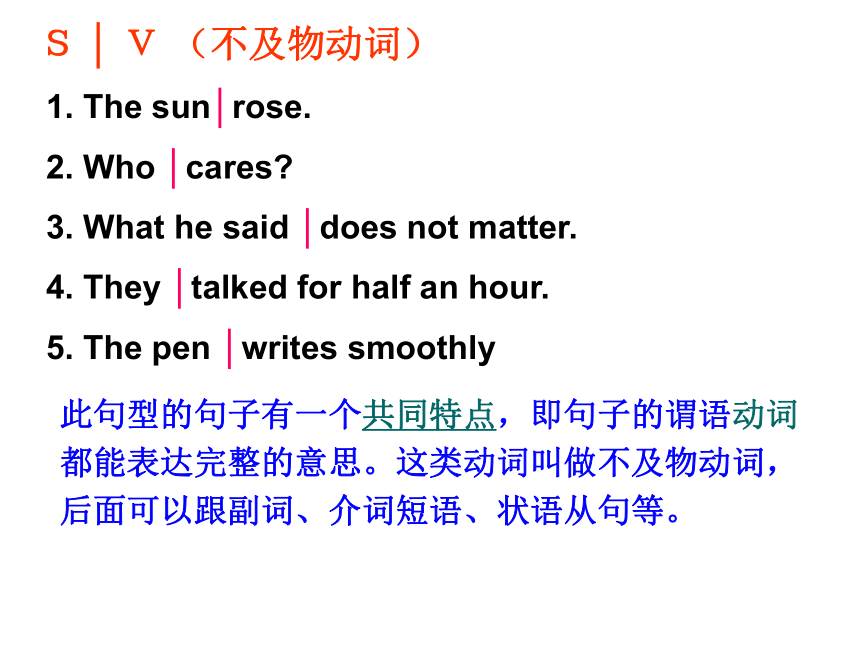
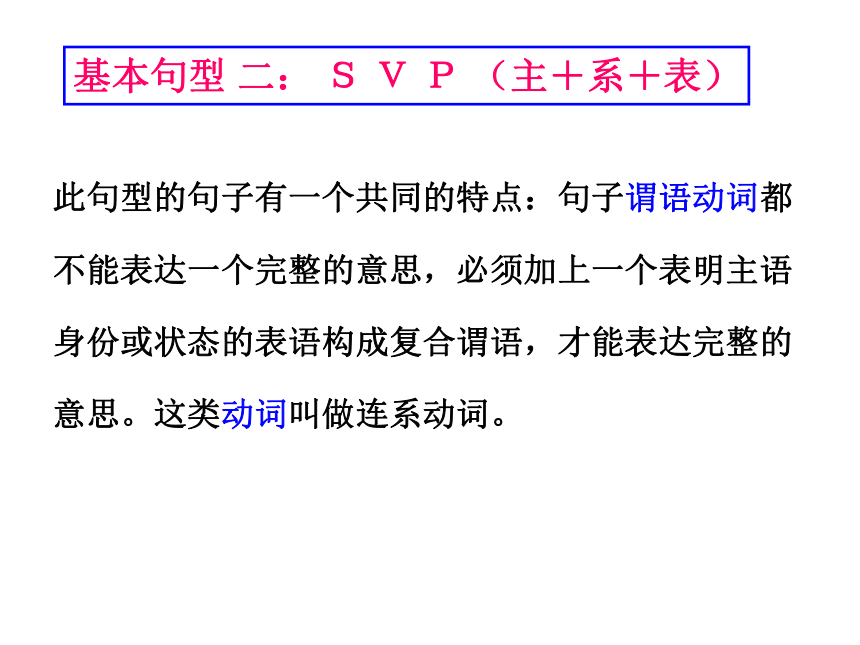
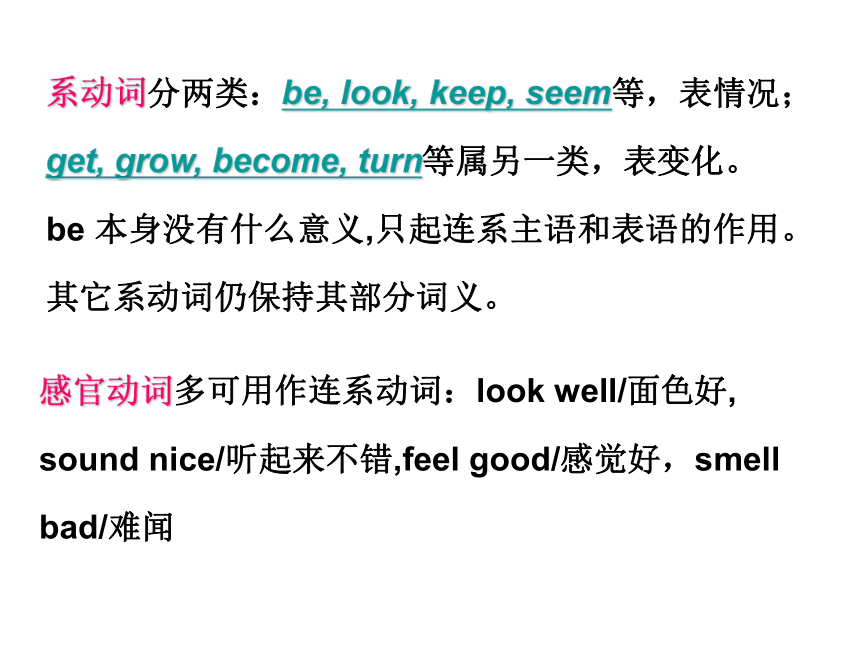
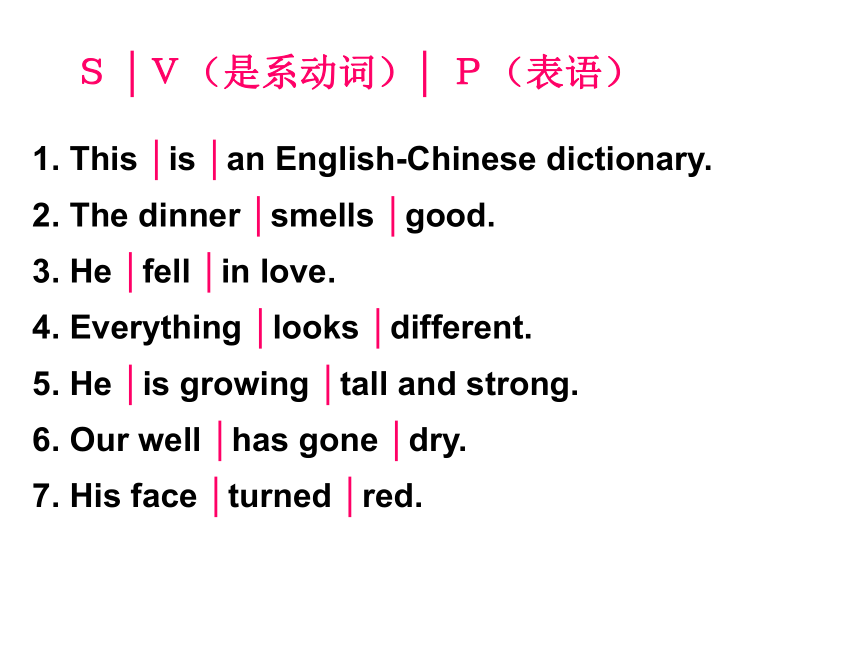
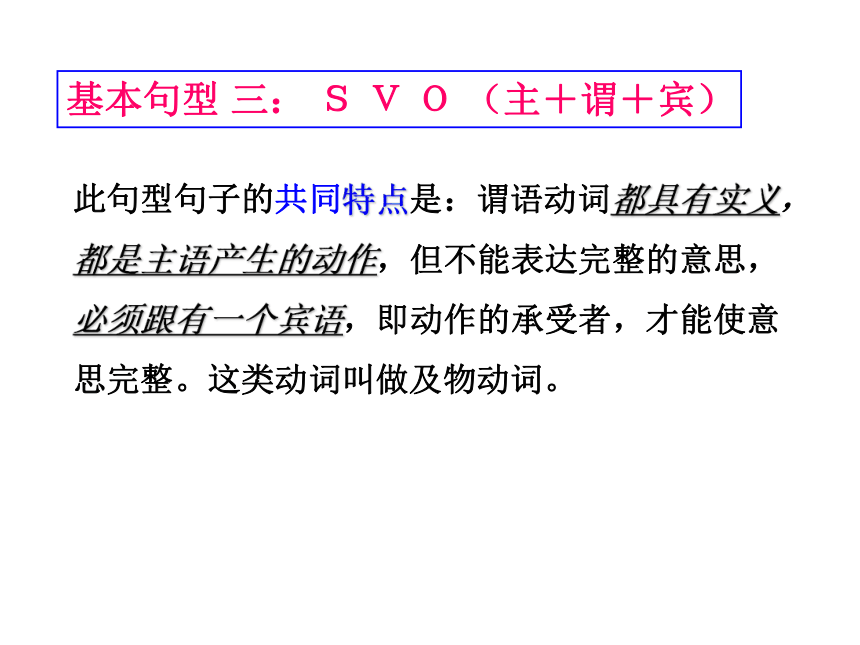
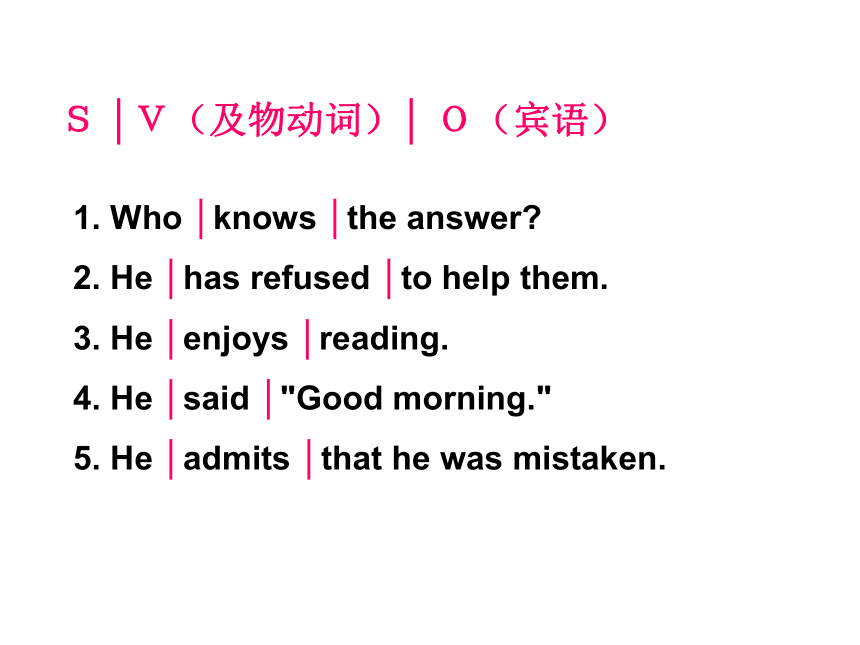
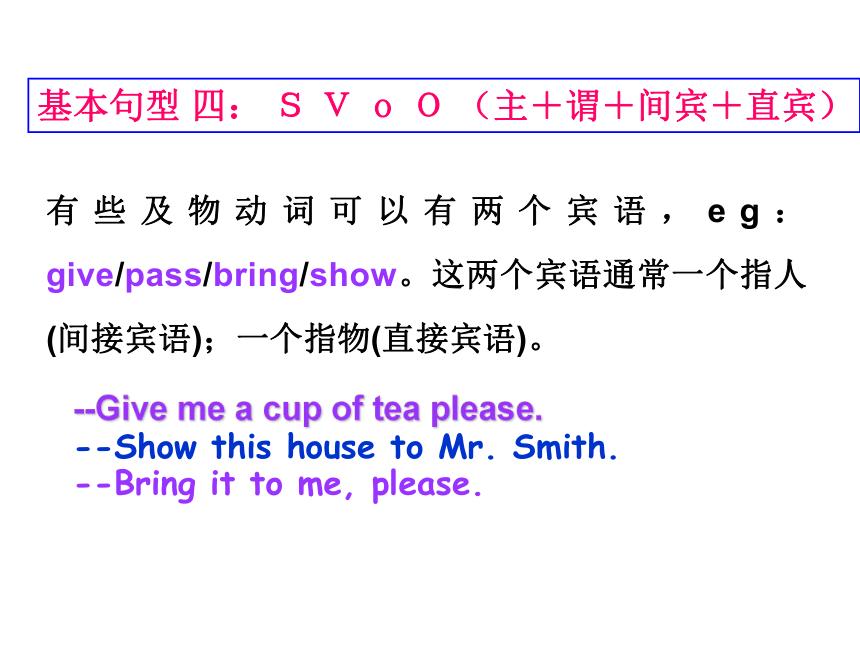
文档简介
课件62张PPT。英语句子概论*句子成分由词或词组充当英语的基本成分有七种:________________________________________________________________________________________________________________________和_________________________主语(subject)、谓语(predicate)、表语(predicative)、宾语(object)、定语(attribute)、状语(adverbial)补语(complement)。英语句子的种类简单句 (simple sentence)
并列句 (compound sentence)复合句 (complex sentence)英语句子的基本结构可以归纳成五种基本句型及其扩大、组合、省略或倒装。掌握这五种基本句型,是掌握各种英语句子结构的基础。一: S V (主+谓)
二: S V P (主+系+表)
三: S V O (主+谓+宾)
四: S V o O (主+谓+间宾+直宾)
五: S V O C (主+谓+宾+宾补)
基本句型 一:S V (主+谓)主语:可以作主语的成分有名词,主格代词,动词不定式,动名词等等。主语一般在句首。谓语:谓语由动词构成,是英语时态、语态变化的主角,一般在主语之后。不及物动词(vi.)没有宾语,形成主谓结构,如:We come.S │ V (不及物动词)1. The sun│rose.
2. Who │cares?
3. What he said │does not matter.
4. They │talked for half an hour.
5. The pen │writes smoothly此句型的句子有一个共同特点,即句子的谓语动词
都能表达完整的意思。这类动词叫做不及物动词,
后面可以跟副词、介词短语、状语从句等。
基本句型 二: S V P (主+系+表)此句型的句子有一个共同的特点:句子谓语动词都不能表达一个完整的意思,必须加上一个表明主语身份或状态的表语构成复合谓语,才能表达完整的意思。这类动词叫做连系动词。系动词分两类:be, look, keep, seem等,表情况;get, grow, become, turn等属另一类,表变化。
be 本身没有什么意义,只起连系主语和表语的作用。其它系动词仍保持其部分词义。感官动词多可用作连系动词:look well/面色好, sound nice/听起来不错,feel good/感觉好,smell bad/难闻 S │V(是系动词)│ P(表语) 1. This │is │an English-Chinese dictionary.
2. The dinner │smells │good.
3. He │fell │in love.
4. Everything │looks │different.
5. He │is growing │tall and strong.
6. Our well │has gone │dry.
7. His face │turned │red. 基本句型 三: S V O (主+谓+宾)此句型句子的共同特点是:谓语动词都具有实义,都是主语产生的动作,但不能表达完整的意思,必须跟有一个宾语,即动作的承受者,才能使意思完整。这类动词叫做及物动词。S │V(及物动词)│ O(宾语)1. Who │knows │the answer?
2. He │has refused │to help them.
3. He │enjoys │reading.
4. He │said │"Good morning."
5. He │admits │that he was mistaken. 基本句型 四: S V o O (主+谓+间宾+直宾)有些及物动词可以有两个宾语,eg:give/pass/bring/show。这两个宾语通常一个指人(间接宾语);一个指物(直接宾语)。--Give me a cup of tea please.
--Show this house to Mr. Smith.
--Bring it to me, please.
S │V(及物)│ o(多指人) │ O(多指物)She │ordered │herself │a new dress.
2. He │brought │you │a dictionary.
3. I │showed │him │my pictures.
4. I │told │him │that the bus was late.
5. He │showed │me │how to run the machine. 基本句型 五: S V O C (主+谓+宾+宾补)此句型的句子的共同特点是:动词虽然是及物动词,但是只跟一个宾语还不能表达完整的意思,必须加上一个补充成分来补足宾语,才能使意思完整。宾语补足语:位于宾语之后对宾语作出说明的成分。可以用作宾语补足语的有名词,形容词,不定式,动名词,分词,介词短语等。S │V(及物)│ O(宾语) │ C(宾补) 1. They │painted │the door │green.
2. This │set │them │thinking.
3. They │found │the house │deserted.
4. He │asked │me │to come back soon.
5. I │saw │them │getting on the bus. a,S V b, S V P c,S V O
d,S V o O e,S V O C 1,Pleas tell us a story._______
2, She smiled.______
3. I have a lot work to do._____
4. His job is to train swimmers._____
5. He noticed a man enter the room._____
6. Please look at the picture._____daebec并列句
把两个或几个简单句用并列连词连接起来。 I turned on the TV. My sister and I watched it.
I turned on the TV and my sister and I watched it.
I bought my sister a present. She didn’t like it.
I bought my sister a present,but she didn’t like it. 并列句并列句常用并列连词: 平行并列连词:
转折并列连词:
因果并列连词:
选择并列连词:and, both…and, not only… but also, neither…norbut, however, while, yet, or,either…orfor, so复合句:主句+从句名词性从句
定语从句
状语从句主语从句
表语从句
宾语从句
同位语从句Noun Clause名词性从句在功能上相当于名词, 在复合句
中能担任主语、宾语、表语、同位语等。
主语 {His job is important.What he does is important.表语This is his job.This is what he does every day. {
宾语I don’t like his job.I don’t like what he does every day.同位语I don’t know about the man, Mr. White.I don’t know about the fact that he is a teacher.Practice time:指出下列各名词性从句的种类。1. At lunchtime, the radio weatherman reported that the mist would become a thick fog in the afternoon.
2. She wondered if the buses would still be running.
3. The truth is that the fog is too thick for the bus to run that far.
4. She sensed that she was being watched by a tall man in a dark coat.
5. When we will start is not clear.
6. I had no idea that you were her friend.
宾语从句宾语从句表语从句宾语从句主语从句同位语从句Object Clauses 宾语从句 I know him .
2. I know who he is . 主语谓语宾语(简单句)主语谓语宾 语 从 句连词从句主语 从句谓语 主 句(复合句)句子做宾语就是宾语从句,跟在及物动词或介词后句子结构:
主句 +连词(引导词)+ 宾语从句。宾语从句的注意事项 句子类型 that陈述句一般疑问句if/whether (是否)特殊疑问词特殊疑问句 一、连词(引导词)
1. 当宾语从句是陈述句时(包括肯定句和否定句),连词由that引导,因为that在从句中不作任何成分,也没有任何具体意思,因此在口语或非正式文体中常省略。Lin Tao feels (that) his own team is even better.
She says (that) she won’t take part in the sports meeting next Sunday.
Jim thought (that) the train was like a big moving party.宾语从句中的连接词that在以下三种情况下
不能省略:
(1)当that 从句与另一名词性从句并列作宾语时,第二个that不能省;
(2)当that从句作介词宾语时,that不可省掉。
(3)用it做形式宾语的宾语从句。
Everyone knew what happened and that she was worried.
The reason lies in that she works harder than the others do.
I think it necessary that you should read English aloud.在主句为动词be加某些形容词(如sorry, sure, afraid, glad等)作表语时,后面所跟的省略that的从句也可算是宾语从句。I’m sorry (that) I don’t know .
We’re sure (that) our team will win .
I’m afraid (that) he won’t pass the exam .2. 当宾语从句是一般疑问句时,由连词whether或if引导, “是否”,不能省略。Lily wanted to know if /whether her grandma
liked the handbag .
Let’s see if /whether we can find out some
information about that city .
She asked me if /whether she could borrow
these books .1).whether和if都可以引导宾语从句
a.当有or not时就用whether,不用if.
I don’t know whether or not I will stay.
b.介词后面的宾语从句不能用if.
I worry about whether I hurt her feeling.
c. whether也可与动词不定式连用但if不能。
I have not decided whether to go or not.
d)whether常与or连用表示一种选择,if不能这样用
The question of whether they are male or female is not important.
注意 whether和if的使用区别:Practice timeif / whether 1. I asked her ____________ she had a bike. 2. We’re worried about _________ he is safe. 3. I don’t know _________ he is well
or not. 4. I don’t know ________ or not he is well. 5. I don’t know __________ I should go.
if / whetherwhetherwhetherwhetherwhether/if_______ to go.whether3. 当宾语从句是特殊疑问句时,由疑问词(what, who, whom, which, whose when, where, how, why等)引导,因为疑问词在从句中担任一定的句子成分,具有一定的意义,所以不可以省略。Do you know what he said just now ?
I don’t remember when we arrived .
I asked him where I could get so much money .
Please tell me who whom we have to see .
Do you know what time the plane leaves ?I don’t know ______ is your brother. Is the man in dark glasses?
I don’t know _______ of the boys is your brother.
I don’t know _______ good they will do.
I’m worried about _______ he will soon get well.
I want to know _________she has gone shopping.
We wondered _________ that was a spy or not.whowhichwhatwhetherwhether/ifwhether
They have decided _____ they will leave for New York. That is next Sunday.
We don’t know _______ they didn’t finish the job in time.
Mother was pleased ______ her daughter had passed the college exams.
Madam Curie discovered ______ she called radium.
Would you mind telling me _______language your friend speaks?
Would you mind telling me _______language your friend speaks, English or French?whenwhythatwhatwhatwhich二、时态
1. 如果主句是现在的时态 (包括一般现在时 ,
现在进行时,现在完成时),从句的时态可根
据实际情况而定,(包括一般现在时,一般过
去时,一般将来时,现在完成时等)。I know he lives here .
I know he lived here ten years ago .
I have heard that he will come tomorrow .2.如果主句是过去的时态(包括一般过去时,过去进行时),那么从句的时态一定要用相对应的过去的某种时态(包括一般过去时,过去进行时,过去将来时, 过去完成时)I knew who lived here.
I saw she was talking with her mother.
He asked whether his father would come back
tomorrow.
He said that he had seen it .3.当从句是客观真理,定义,公理,定理
时用一般现在时。The teacher said that the earth travels
around the sun.He asked whether his father will come back.
He said that he has seen it.
The teacher said that the earth traveled around the sun.hadwould改错:travels三、语序
宾语从句的语序用陈述语序:
连接词+主语+谓语+其他成分。I don’t know what is the matter the troublewrong with him.1. When will he go to the library?
His brother asks when he will go to the library .
His brother asks when will he go to the library . 2. What does he want to buy ?
I don’t know what he wants to buy .
I don’t know what does he want to buy . ??四、虚拟语气在宾语从句中的应用1)wish + 宾语从句
I wish I were a doctor.
I wish I should go abroad next year.
3) I wish I had seen the football match.与现在事实相反,宾语从句的谓语动词用过去时。与将来事实相反,宾语从句的谓语动词用should, would, could, might + 动词原形。与过去事实相反,宾语从句的谓语动词用过去完成时。– Did you see Rose before she went to England?
-- No. I wish I ____ her.
A. see B. saw C. had seen D. should see
2) – Joe has three sisters, doesn’t he?
-- No wonder he wishes he ____ a brother.
A. had B. will have C. have D. can have
3) – Maybe Paula will bring us good news about out tests.
-- I wish she _____.
A. does B. brings it C. will D. wouldCAD2) suggest等 + 宾语从句。这类动词有:order, insist, demand, desire, command, propose, request等。
The teacher suggested that our sports meeting (should) be put off till next week.
The headmaster ordered that all of the students (should) be here on time.在宾语从句中,谓语动词用should + 动词原形,should可省略。注意:insist, suggest后接的宾语从句不用虚拟语气的情况。she insisted that she was right.
2) The look on his face suggested that he was unhappy.当insist的意思是坚持某人自己的观点时,后接的宾语从句不能用虚拟语气。当suggest的意思是暗示、表明时,后接的宾语从句不能用虚拟语气。We demanded that he ____ the bill by the end of the month.
A. would pay B. pay C. paid D. had paid
2) -- Did your father go to New York?
-- No, his doctor suggested that he ____.
A. not go B. isn’t going C. didn’t go D.won’t go
3) His saying suggested he ___ with her words.
A. not agree B. didn’t agree
C. hadn’t agree D. doesn’t agree BAB五. 否定的转移
若主句谓语动词为think, consider, suppose, believe, expect, fancy, guess, imagine等,其后的宾语从句若含有否定意义,一般要把否定词转移到主句谓语上,从句谓语用肯定式。例如:
________________________________我认为这件衣服不适合你穿。I don’t think the dress fits you well
I don’t think you’re right.
我认为你不对.
I don’t believe he will leave us.
我相信他不会离开我们.六.that和what引导宾语从句的区别:
选用that还是what要从分析句子成分入手。that只起引导词的作用,在宾语从句中不担任任何成分,通常可以省略;what引导宾语从句除起连接作用外,还在句子中担任主语、宾语、表语、定语等句子成分。
1. People have heard what the President has said; they are waiting to see ________ he will do.
A. how B. what C. when D. that
B七.wh-词与wh- + ever引导宾语从句的区别:
wh- + ever引起的宾语从句不含疑问意义,相当于名词 / 代词后加一个定语从句;而what, which, who, whom, when, where, how等除与前一种从句有相同的含义之外,还都有疑问意义。
1. These wild flowers are so special I would do ________ I can to save them.
A. whatever B. that C. which D. whichever
A2. It’s a matter of ______ would take the position. A. who B. whoever
C. whom D. whomever A八. it常可以放在动词think, make, find, feel, consider, believe等后作为形式宾语,此时引导宾从that的不可省略.
We heard it that she would get married next month.
我们当时听说她下个月将要结婚了.
Do you consider it necessary that I say it again?
你认为我有必要再重复一次吗?九.注意if /when引导的是哪一类从句
Do you know if ______back next week ? If he ______ back , please let me know .
he comes , will come
B. will he come , comes
C. he will come , comes
D. he will come , will come
CI don’t know when he _________ (come) . I can’t wait here any more . When he _______ (come) , would you please ask him to call me ?will comecomesPredicative Clauses 表语从句1. It looked as if it was going to snow.
主 系 表从
2. The problem was who could do the work.
主 系 表从
3. That is why the brothers wanted to make
主 系 表从
a bet.
位于连系动词之后充当表语的句子叫作表语从句.
表语从句的连接词( 四大类) that 引导的表语从句, 本身无意义,
但不能省略.
2. whether 引导的表语从句意为: “是否”. 不能
用 if 替代.
what , which ,who, whom, whose可
在表语从句中充当“ 主语, 宾语,定语, 有自己的词义.
4. where ,when, why, how
在表语从句中可充当地点,时间,原因,方式状语.注 意:It/That/ This is /was because /why ….
why强调结果, because 强调原因
他病了,所以被送到医院来。
他被送到医院,是因为他生病了。
2. The reason (why…/for…)is /was that….
He was ill. That’s why he was sent to the hospital.
He was sent to the hospital. That’s because he was ill. The reason ____ I was absent from school is ____ I was ill yesterday.
A why, because B that, because
C why, that D that, thatC3.语序:陈述语序
1.The question is when can he arrive at the hotel.
2.It looked as if he understood the
question. But actually, he didn’t.
3.The question is if you can stick to your plan.
he canhad understoodwhether4. 表语从句中的虚拟语气1)主语为advice, order, idea,?notion,?proposal, suggestion,?request等一些表示“建议、劝说、命令”的名词,之后的表语从句中,谓语动词用虚拟语气。should+动词原形表示,should可省略。如: ???? My suggestion is that we (should) start early tomorrow.我的建议是我们明天一早就出发。
???? Our?only?request?is?that?this?should?be?settled?as?soon?as?possible.我们唯一的请求就是尽快解决这个问题。2)? as if/though引导的表语从句时,如果从句中的情况与事实不相符。从句谓语多用虚拟语气。
a.如果从句表示与现在事实相反,谓语动词用一般过去式;
b. 如果从句表示与过去事实相反时,谓语动词“had+ done”,?
c. 如果从句表示将来的可能性不大,用would (might ,could )?+动词原形,如
Li Lei is now in a new jacket he looks as if he were an??American boy.
但是,如果as if ,as though 引导的表语从句所表示的与事实相符,从句则用陈述语气,如: The clouds are gathering. It looks as if it is going to rain.? 1. That’s ___ the Party called on us to do.
A. why B. what C. how D. that
2. The reason is ___ he is unable to operate the machine.
A. because B. why C. that D. Whether
3 .That is ___ they separated.
A. that B. what C. which D. where
4.Jane is no longer ___ she was four years ago.
A. what B. which C. that D. when
并列句 (compound sentence)复合句 (complex sentence)英语句子的基本结构可以归纳成五种基本句型及其扩大、组合、省略或倒装。掌握这五种基本句型,是掌握各种英语句子结构的基础。一: S V (主+谓)
二: S V P (主+系+表)
三: S V O (主+谓+宾)
四: S V o O (主+谓+间宾+直宾)
五: S V O C (主+谓+宾+宾补)
基本句型 一:S V (主+谓)主语:可以作主语的成分有名词,主格代词,动词不定式,动名词等等。主语一般在句首。谓语:谓语由动词构成,是英语时态、语态变化的主角,一般在主语之后。不及物动词(vi.)没有宾语,形成主谓结构,如:We come.S │ V (不及物动词)1. The sun│rose.
2. Who │cares?
3. What he said │does not matter.
4. They │talked for half an hour.
5. The pen │writes smoothly此句型的句子有一个共同特点,即句子的谓语动词
都能表达完整的意思。这类动词叫做不及物动词,
后面可以跟副词、介词短语、状语从句等。
基本句型 二: S V P (主+系+表)此句型的句子有一个共同的特点:句子谓语动词都不能表达一个完整的意思,必须加上一个表明主语身份或状态的表语构成复合谓语,才能表达完整的意思。这类动词叫做连系动词。系动词分两类:be, look, keep, seem等,表情况;get, grow, become, turn等属另一类,表变化。
be 本身没有什么意义,只起连系主语和表语的作用。其它系动词仍保持其部分词义。感官动词多可用作连系动词:look well/面色好, sound nice/听起来不错,feel good/感觉好,smell bad/难闻 S │V(是系动词)│ P(表语) 1. This │is │an English-Chinese dictionary.
2. The dinner │smells │good.
3. He │fell │in love.
4. Everything │looks │different.
5. He │is growing │tall and strong.
6. Our well │has gone │dry.
7. His face │turned │red. 基本句型 三: S V O (主+谓+宾)此句型句子的共同特点是:谓语动词都具有实义,都是主语产生的动作,但不能表达完整的意思,必须跟有一个宾语,即动作的承受者,才能使意思完整。这类动词叫做及物动词。S │V(及物动词)│ O(宾语)1. Who │knows │the answer?
2. He │has refused │to help them.
3. He │enjoys │reading.
4. He │said │"Good morning."
5. He │admits │that he was mistaken. 基本句型 四: S V o O (主+谓+间宾+直宾)有些及物动词可以有两个宾语,eg:give/pass/bring/show。这两个宾语通常一个指人(间接宾语);一个指物(直接宾语)。--Give me a cup of tea please.
--Show this house to Mr. Smith.
--Bring it to me, please.
S │V(及物)│ o(多指人) │ O(多指物)She │ordered │herself │a new dress.
2. He │brought │you │a dictionary.
3. I │showed │him │my pictures.
4. I │told │him │that the bus was late.
5. He │showed │me │how to run the machine. 基本句型 五: S V O C (主+谓+宾+宾补)此句型的句子的共同特点是:动词虽然是及物动词,但是只跟一个宾语还不能表达完整的意思,必须加上一个补充成分来补足宾语,才能使意思完整。宾语补足语:位于宾语之后对宾语作出说明的成分。可以用作宾语补足语的有名词,形容词,不定式,动名词,分词,介词短语等。S │V(及物)│ O(宾语) │ C(宾补) 1. They │painted │the door │green.
2. This │set │them │thinking.
3. They │found │the house │deserted.
4. He │asked │me │to come back soon.
5. I │saw │them │getting on the bus. a,S V b, S V P c,S V O
d,S V o O e,S V O C 1,Pleas tell us a story._______
2, She smiled.______
3. I have a lot work to do._____
4. His job is to train swimmers._____
5. He noticed a man enter the room._____
6. Please look at the picture._____daebec并列句
把两个或几个简单句用并列连词连接起来。 I turned on the TV. My sister and I watched it.
I turned on the TV and my sister and I watched it.
I bought my sister a present. She didn’t like it.
I bought my sister a present,but she didn’t like it. 并列句并列句常用并列连词: 平行并列连词:
转折并列连词:
因果并列连词:
选择并列连词:and, both…and, not only… but also, neither…norbut, however, while, yet, or,either…orfor, so复合句:主句+从句名词性从句
定语从句
状语从句主语从句
表语从句
宾语从句
同位语从句Noun Clause名词性从句在功能上相当于名词, 在复合句
中能担任主语、宾语、表语、同位语等。
主语 {His job is important.What he does is important.表语This is his job.This is what he does every day. {
宾语I don’t like his job.I don’t like what he does every day.同位语I don’t know about the man, Mr. White.I don’t know about the fact that he is a teacher.Practice time:指出下列各名词性从句的种类。1. At lunchtime, the radio weatherman reported that the mist would become a thick fog in the afternoon.
2. She wondered if the buses would still be running.
3. The truth is that the fog is too thick for the bus to run that far.
4. She sensed that she was being watched by a tall man in a dark coat.
5. When we will start is not clear.
6. I had no idea that you were her friend.
宾语从句宾语从句表语从句宾语从句主语从句同位语从句Object Clauses 宾语从句 I know him .
2. I know who he is . 主语谓语宾语(简单句)主语谓语宾 语 从 句连词从句主语 从句谓语 主 句(复合句)句子做宾语就是宾语从句,跟在及物动词或介词后句子结构:
主句 +连词(引导词)+ 宾语从句。宾语从句的注意事项 句子类型 that陈述句一般疑问句if/whether (是否)特殊疑问词特殊疑问句 一、连词(引导词)
1. 当宾语从句是陈述句时(包括肯定句和否定句),连词由that引导,因为that在从句中不作任何成分,也没有任何具体意思,因此在口语或非正式文体中常省略。Lin Tao feels (that) his own team is even better.
She says (that) she won’t take part in the sports meeting next Sunday.
Jim thought (that) the train was like a big moving party.宾语从句中的连接词that在以下三种情况下
不能省略:
(1)当that 从句与另一名词性从句并列作宾语时,第二个that不能省;
(2)当that从句作介词宾语时,that不可省掉。
(3)用it做形式宾语的宾语从句。
Everyone knew what happened and that she was worried.
The reason lies in that she works harder than the others do.
I think it necessary that you should read English aloud.在主句为动词be加某些形容词(如sorry, sure, afraid, glad等)作表语时,后面所跟的省略that的从句也可算是宾语从句。I’m sorry (that) I don’t know .
We’re sure (that) our team will win .
I’m afraid (that) he won’t pass the exam .2. 当宾语从句是一般疑问句时,由连词whether或if引导, “是否”,不能省略。Lily wanted to know if /whether her grandma
liked the handbag .
Let’s see if /whether we can find out some
information about that city .
She asked me if /whether she could borrow
these books .1).whether和if都可以引导宾语从句
a.当有or not时就用whether,不用if.
I don’t know whether or not I will stay.
b.介词后面的宾语从句不能用if.
I worry about whether I hurt her feeling.
c. whether也可与动词不定式连用但if不能。
I have not decided whether to go or not.
d)whether常与or连用表示一种选择,if不能这样用
The question of whether they are male or female is not important.
注意 whether和if的使用区别:Practice timeif / whether 1. I asked her ____________ she had a bike. 2. We’re worried about _________ he is safe. 3. I don’t know _________ he is well
or not. 4. I don’t know ________ or not he is well. 5. I don’t know __________ I should go.
if / whetherwhetherwhetherwhetherwhether/if_______ to go.whether3. 当宾语从句是特殊疑问句时,由疑问词(what, who, whom, which, whose when, where, how, why等)引导,因为疑问词在从句中担任一定的句子成分,具有一定的意义,所以不可以省略。Do you know what he said just now ?
I don’t remember when we arrived .
I asked him where I could get so much money .
Please tell me who whom we have to see .
Do you know what time the plane leaves ?I don’t know ______ is your brother. Is the man in dark glasses?
I don’t know _______ of the boys is your brother.
I don’t know _______ good they will do.
I’m worried about _______ he will soon get well.
I want to know _________she has gone shopping.
We wondered _________ that was a spy or not.whowhichwhatwhetherwhether/ifwhether
They have decided _____ they will leave for New York. That is next Sunday.
We don’t know _______ they didn’t finish the job in time.
Mother was pleased ______ her daughter had passed the college exams.
Madam Curie discovered ______ she called radium.
Would you mind telling me _______language your friend speaks?
Would you mind telling me _______language your friend speaks, English or French?whenwhythatwhatwhatwhich二、时态
1. 如果主句是现在的时态 (包括一般现在时 ,
现在进行时,现在完成时),从句的时态可根
据实际情况而定,(包括一般现在时,一般过
去时,一般将来时,现在完成时等)。I know he lives here .
I know he lived here ten years ago .
I have heard that he will come tomorrow .2.如果主句是过去的时态(包括一般过去时,过去进行时),那么从句的时态一定要用相对应的过去的某种时态(包括一般过去时,过去进行时,过去将来时, 过去完成时)I knew who lived here.
I saw she was talking with her mother.
He asked whether his father would come back
tomorrow.
He said that he had seen it .3.当从句是客观真理,定义,公理,定理
时用一般现在时。The teacher said that the earth travels
around the sun.He asked whether his father will come back.
He said that he has seen it.
The teacher said that the earth traveled around the sun.hadwould改错:travels三、语序
宾语从句的语序用陈述语序:
连接词+主语+谓语+其他成分。I don’t know what is the matter the troublewrong with him.1. When will he go to the library?
His brother asks when he will go to the library .
His brother asks when will he go to the library . 2. What does he want to buy ?
I don’t know what he wants to buy .
I don’t know what does he want to buy . ??四、虚拟语气在宾语从句中的应用1)wish + 宾语从句
I wish I were a doctor.
I wish I should go abroad next year.
3) I wish I had seen the football match.与现在事实相反,宾语从句的谓语动词用过去时。与将来事实相反,宾语从句的谓语动词用should, would, could, might + 动词原形。与过去事实相反,宾语从句的谓语动词用过去完成时。– Did you see Rose before she went to England?
-- No. I wish I ____ her.
A. see B. saw C. had seen D. should see
2) – Joe has three sisters, doesn’t he?
-- No wonder he wishes he ____ a brother.
A. had B. will have C. have D. can have
3) – Maybe Paula will bring us good news about out tests.
-- I wish she _____.
A. does B. brings it C. will D. wouldCAD2) suggest等 + 宾语从句。这类动词有:order, insist, demand, desire, command, propose, request等。
The teacher suggested that our sports meeting (should) be put off till next week.
The headmaster ordered that all of the students (should) be here on time.在宾语从句中,谓语动词用should + 动词原形,should可省略。注意:insist, suggest后接的宾语从句不用虚拟语气的情况。she insisted that she was right.
2) The look on his face suggested that he was unhappy.当insist的意思是坚持某人自己的观点时,后接的宾语从句不能用虚拟语气。当suggest的意思是暗示、表明时,后接的宾语从句不能用虚拟语气。We demanded that he ____ the bill by the end of the month.
A. would pay B. pay C. paid D. had paid
2) -- Did your father go to New York?
-- No, his doctor suggested that he ____.
A. not go B. isn’t going C. didn’t go D.won’t go
3) His saying suggested he ___ with her words.
A. not agree B. didn’t agree
C. hadn’t agree D. doesn’t agree BAB五. 否定的转移
若主句谓语动词为think, consider, suppose, believe, expect, fancy, guess, imagine等,其后的宾语从句若含有否定意义,一般要把否定词转移到主句谓语上,从句谓语用肯定式。例如:
________________________________我认为这件衣服不适合你穿。I don’t think the dress fits you well
I don’t think you’re right.
我认为你不对.
I don’t believe he will leave us.
我相信他不会离开我们.六.that和what引导宾语从句的区别:
选用that还是what要从分析句子成分入手。that只起引导词的作用,在宾语从句中不担任任何成分,通常可以省略;what引导宾语从句除起连接作用外,还在句子中担任主语、宾语、表语、定语等句子成分。
1. People have heard what the President has said; they are waiting to see ________ he will do.
A. how B. what C. when D. that
B七.wh-词与wh- + ever引导宾语从句的区别:
wh- + ever引起的宾语从句不含疑问意义,相当于名词 / 代词后加一个定语从句;而what, which, who, whom, when, where, how等除与前一种从句有相同的含义之外,还都有疑问意义。
1. These wild flowers are so special I would do ________ I can to save them.
A. whatever B. that C. which D. whichever
A2. It’s a matter of ______ would take the position. A. who B. whoever
C. whom D. whomever A八. it常可以放在动词think, make, find, feel, consider, believe等后作为形式宾语,此时引导宾从that的不可省略.
We heard it that she would get married next month.
我们当时听说她下个月将要结婚了.
Do you consider it necessary that I say it again?
你认为我有必要再重复一次吗?九.注意if /when引导的是哪一类从句
Do you know if ______back next week ? If he ______ back , please let me know .
he comes , will come
B. will he come , comes
C. he will come , comes
D. he will come , will come
CI don’t know when he _________ (come) . I can’t wait here any more . When he _______ (come) , would you please ask him to call me ?will comecomesPredicative Clauses 表语从句1. It looked as if it was going to snow.
主 系 表从
2. The problem was who could do the work.
主 系 表从
3. That is why the brothers wanted to make
主 系 表从
a bet.
位于连系动词之后充当表语的句子叫作表语从句.
表语从句的连接词( 四大类) that 引导的表语从句, 本身无意义,
但不能省略.
2. whether 引导的表语从句意为: “是否”. 不能
用 if 替代.
what , which ,who, whom, whose可
在表语从句中充当“ 主语, 宾语,定语, 有自己的词义.
4. where ,when, why, how
在表语从句中可充当地点,时间,原因,方式状语.注 意:It/That/ This is /was because /why ….
why强调结果, because 强调原因
他病了,所以被送到医院来。
他被送到医院,是因为他生病了。
2. The reason (why…/for…)is /was that….
He was ill. That’s why he was sent to the hospital.
He was sent to the hospital. That’s because he was ill. The reason ____ I was absent from school is ____ I was ill yesterday.
A why, because B that, because
C why, that D that, thatC3.语序:陈述语序
1.The question is when can he arrive at the hotel.
2.It looked as if he understood the
question. But actually, he didn’t.
3.The question is if you can stick to your plan.
he canhad understoodwhether4. 表语从句中的虚拟语气1)主语为advice, order, idea,?notion,?proposal, suggestion,?request等一些表示“建议、劝说、命令”的名词,之后的表语从句中,谓语动词用虚拟语气。should+动词原形表示,should可省略。如: ???? My suggestion is that we (should) start early tomorrow.我的建议是我们明天一早就出发。
???? Our?only?request?is?that?this?should?be?settled?as?soon?as?possible.我们唯一的请求就是尽快解决这个问题。2)? as if/though引导的表语从句时,如果从句中的情况与事实不相符。从句谓语多用虚拟语气。
a.如果从句表示与现在事实相反,谓语动词用一般过去式;
b. 如果从句表示与过去事实相反时,谓语动词“had+ done”,?
c. 如果从句表示将来的可能性不大,用would (might ,could )?+动词原形,如
Li Lei is now in a new jacket he looks as if he were an??American boy.
但是,如果as if ,as though 引导的表语从句所表示的与事实相符,从句则用陈述语气,如: The clouds are gathering. It looks as if it is going to rain.? 1. That’s ___ the Party called on us to do.
A. why B. what C. how D. that
2. The reason is ___ he is unable to operate the machine.
A. because B. why C. that D. Whether
3 .That is ___ they separated.
A. that B. what C. which D. where
4.Jane is no longer ___ she was four years ago.
A. what B. which C. that D. when
同课章节目录
